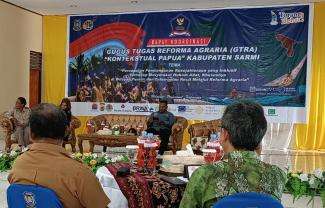Throughout 2022, Samdhana continued to support the efforts of Masyarakat Adat (indigenous people) to secure government recognition of ulayat rights in Sarmi Regency. Community members and local organizations were involved in various activities, starting with a menoken with the local government, indigenous communities, and other stakeholders. In the Menoken, they exchanged thoughts and ideas to promote the district’s abundant natural and historical potential, and more importantly, how customary their rights will be recognized.
Sarmi is characterized by vast forests, spanning 1,435,791 hectares. It is known for the sago forests, which are vital food sources. The protected forests are home to diverse wildlife, such as pigs, kangaroos, cassowaries, parrots, white-headed eagles, and Cenderawasih. Sarmi’s coastal areas offer significant marine resources, utilized by locals for processed food production, like shredded mackerel.
The Indigenous People mostly reside in five areas: Sobey, Armati, Rumbuai, Manirem, and Isirawa, commonly referred to also as SARMI.
These communities have managed their territories using local wisdom passed down through generations. However, due to existing laws that grant the government control over land in Indonesia, the mechanisms to formally recognize their customary rights and registering their land are not clear. This has affected their access to healthy food, water, and other essential resources.
We supported Partner communities to access the government programs on agrarian reform and social forestry to secure their land rights. Achieving this requires strong synergy between the Central Government and Regional Governments, particularly at the district/city level as well as the local communities. The Task Force of Agrarian Reform (GTRA) serves as a platform for collaboration, coordination, and synergy among various government agencies, ministries, institutions, NGOs, and CSOs, all working towards accelerating rights and welfare development in Sarmi Regency.
Support for Indigenous Peoples extends to integrating mapping and agrarian reform within the Papuan context. This includes asset management, conceptual and community mapping, planning and capacity development so that communities are able to generate evidence of their land rights. Despite the lack of legal and binding force of formal recognition, Indigenous peoples continue to manage their territories considering it as hereditary land, and living out the customary traditions.
Policy development support in partnership with local CSOs and other stakeholders is a continuing work in Papua, to integrate the status and rights of indigenous peoples into state policy mechanisms.




